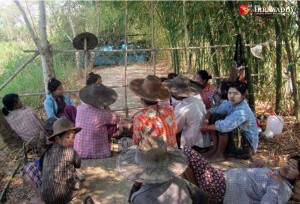Burma Still Requires the UN Human Rights Council’s Attention
By Burma Partnership • March 4, 2013 This week 22 organizations from Burma released a statement calling on the 22nd Session of the United Nations Human Rights Council to maintain its resolution on the situation of human rights in Burma under item 4 as “Human rights situations that require the Council’s attention” and to renew the full mandate of the Special Rapporteur Tomás Ojea Quintana. Serious human rights challenges that require the Council’s attention remain as the events of this week illustrate.
This week 22 organizations from Burma released a statement calling on the 22nd Session of the United Nations Human Rights Council to maintain its resolution on the situation of human rights in Burma under item 4 as “Human rights situations that require the Council’s attention” and to renew the full mandate of the Special Rapporteur Tomás Ojea Quintana. Serious human rights challenges that require the Council’s attention remain as the events of this week illustrate.
Border Security Forces in Arakan State allegedly raped 13 young Rohingya women. This highlights the serious remaining issues of the rampant culture of impunity for security forces and the Burma Army and the decades-long discrimination against the Rohingya organized and perpetuated by the government.
In Kachin State, despite ceasefire talks, fighting continued this week making more and more victims on the civilian side. The Kachin Women’s Association Thailand (KWAT) released the report State Terrors in Kachin Hills documenting 26 cases over the last 6 months of civilians being killed or injured in Burma Army artillery attacks. KWAT called on the international community to help stop these attacks and protect the civilian population. Meanwhile, on Friday the parliament approved a US$1.15 billion military budget, representing one-fifth of the total budget and perpetuating the supremacy of the Burma Army.
Other illustrations of the security forces brutality took place this week in Mandalay Division, when 4 protesters against electricity shortages were hospitalized after clashes with the police and in Maubin Township, Irrawaddy Division, where the police shot and wounded at least nine farmers trying to take back land that was confiscated over a decade ago and beat two women bystanders. This reminds us that there is still no freedom of assembly and association in Burma despite the reforms. The government continues to suppress the activities of dissidents through arbitrary arrests, detentions, and judicial harassment and the use of Section 18 of the Peaceful Assembly and Peaceful Procession Law. This new law, welcomed as a progress in the front of human rights actually bars public gatherings without official permission, and is used to criminalize the peaceful activities of human rights defenders and activists.
Another very expected law, seen as a way to finally respect and implement freedom of expression in Burma came as a huge disappointment this week. The draft Press Law Bill preserves censorship as it bans reporting on several vague topics, including any news or commentary critical of the military-drafted 2008 Constitution. “If passed in its current form, the draft law will essentially replace Burma’s old censorship regime with a similarly repressive new one,” said Committee to Protect Journalist’s senior Southeast Asia representative.
“In order for our country to become truly democratic, it is essential that people in Myanmar can fully and safely exercise their freedom of expression, assembly and association,” said Htay Kywe, a former political prisoner and leader of 88 Generation Students Group said from Geneva this week. “We need the Human Rights Council and the Special Rapporteur to continue to encourage the Myanmar government to carry out systematic reforms to establish the rule of law. The government must develop an independent and impartial justice system, implement good governance practices, guarantee inclusive and safe participation of all in the reform process and release all remaining political prisoners.”
The events of this week are enough to realize that serious human rights challenges remain in Burma that must not be forgotten about. President Thein Sein’s government is sensitive to international attention and pressure. Thus, enhanced scrutiny and monitoring are more essential than ever before. Both the Human Rights Council Resolution and the mandate of the Special Rapporteur on the situation of human rights in Burma are crucial international tools to highlight the remaining challenges and ensure that reforms move in a positive direction.
Tags: Arakan State, Armed Conflict, Burma Partnership, Htay Kywe, Kachin State, Press Law Bill, Protest, Sexual Violence, Special Rapporteur, United Nations Human Rights CouncilThis post is in: Blog
Related PostsU.S.: Lifting Sanctions on Myanmar Puts Human Rights Progress At Risk
Advisory Commission on Rakhine State – A Welcome Investigation into Arakan State’s Human Rights and Humanitarian Crisis
NLD Government Must Lift All Aid Restrictions in Arakan State
United States Commission on International Religious Freedom – Burma: 2016 Annual Report
(၂၉) ႏွစ္ေျမာက္ စစ္ေတြဆန္ျပႆနာေန႔ ဝမ္းနည္းေအာက္ေမ့ဖြယ္ အထိမ္းအမွတ္ သေဘာထားထုတ္ျပန္ခ်က္









 All posts
All posts